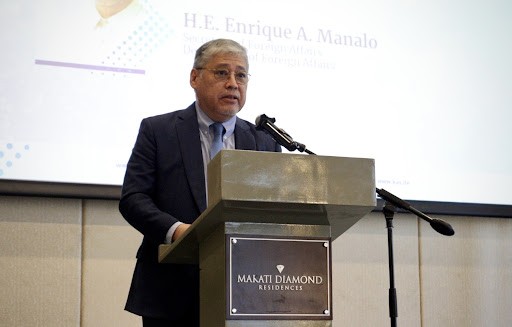News
PH bats for UNCLOS-based COC in South China Sea

CODE OF CONDUCT. Foreign Affairs Secretary Enrique A. Manalo gives his keynote speech at the Dialogue on Maritime Governance in the South China Sea in Makati on Wednesday. He said the Philippine government is pushing for a Code of Conduct in the South China Sea that is anchored on the United Nations Convention on the Law of the Sea (UNCLOS). (DFA photo by Maria Vanessa Ubac)
MANILA – The Philippine government is pushing for a Code of Conduct (COC) in the South China Sea that is anchored on the United Nations Convention on the Law of the Sea (UNCLOS), the Department of Foreign Affairs (DFA) said Wednesday.
UNCLOS, also the basis of a Hague-based arbitration award that denied Beijing’s “historical rights” over the South China Sea, is regarded as the Constitution of the Oceans that defines the rights of a coastal state in the seas.
It also covers freedom of navigation, development of resources and preservation of marine environment, among others.
“A Code of Conduct which finds its moorings on UNCLOS, is part of the diplomatic solution for the management and resolution of disputes in the South China Sea,” said Foreign Affairs Secretary Enrique Manalo during the highly anticipated “Dialogue on Maritime Governance in the South China Sea” co-organized by the Konrad-Adenauer-Stiftung Philippines (KAS-PH) and the Foreign Service Institute Philippines (FSI) in Makati.
“The Philippines advocates for an effective and substantive code of conduct that adheres to UNCLOS and takes into account the interests of all stakeholders, even extending beyond ASEAN (Association of Southeast Asian Nations) and China,” he added.
Manalo said Manila’s approach has always been “peace” as he underscores the UNCLOS’ significance as the “arbiter of good governance and order” in the disputed waters.
“Peace is in our approach, as embodied in the 1982 Manila Declaration on the Peaceful Settlement of International Disputes, which reaffirms the principles set out in the United Nations Charter that all States shall settle their disputes by peaceful means,” he said.
“Rule of law ensures equity in the global commons. Current complexions in the South China Sea underline its significance in governing this particular maritime domain,” he added.
Manalo pointed out that this approach will also be “crucial” in maintaining an open, inclusive and free Indo-Pacific region and the momentum of global economic growth.
China and ASEAN first started the COC discussions in 1999 but were only able to produce the nonbinding Declaration on the Conduct (DOC) of Parties in the South China Sea in 2002.
Senior officials from China and member states of the ASEAN will be meeting for the next round of COC talks in Manila from Aug. 22 to 24.
During the Makati dialogue, KAS-PH Country Director Daniela Braun said the South China Sea has become a potential flashpoint prompting the need to discuss dispute management.
Braun said China’s sweeping claims of sovereignty in the sea, extensive land reclamation, and harassment of boats from the Philippines have antagonized competing claimant states.
In addition, she said tensions between China and the US are also “increasing” while the latter protects its security and economic interests in the region.
“These dynamics show that the risk of an armed conflict is growing and a real concern,” Braun said.





















